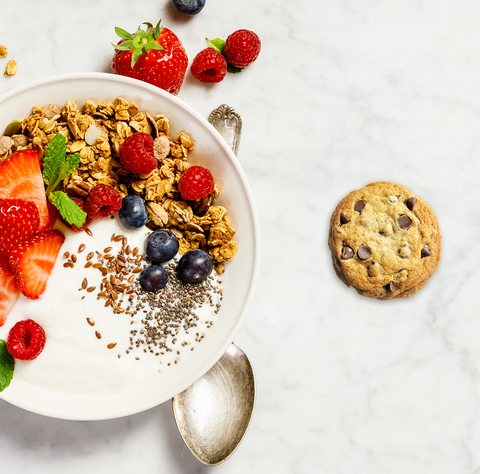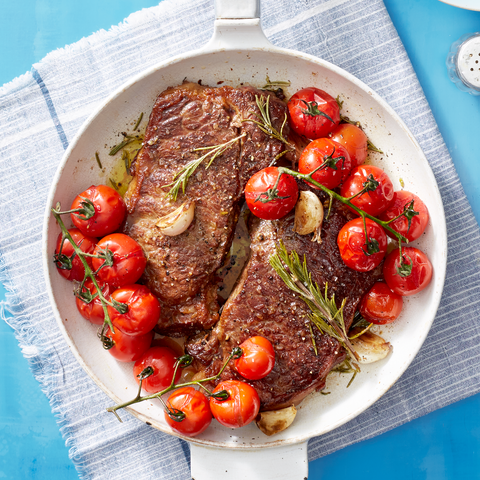Top Ten Fastest Weight Loss Diets
You may have already attempted to change your diet this year — and maybe even failed spectacularly at it. The truth is, most of the popular diets of the moment are truly restrictive: Many keto dieters and those who have attempted Whole30 can easily tell you how hard it is to completely eradicate food groups from your daily routine. But losing weight isn't always about cutting things out; in fact, it might be about adding more foods into your lineup, says Stefani Sassos, MS, RD, CDN, a registered dietitian in the Good Housekeeping Institute.
The best diets on our list may not be as trendy as the worst diets on this list, but Sassos says they'll set you up for success when it comes to maintaining healthy weight loss over a longer period of time (and possibly, for good!). Regardless of which diet you choose to try this year, you need to practice the following advice in order to truly reap all the benefits that sustained weight loss can offer:
- Hydrate: "It's the very first thing you can do for your body, and believe it or not, being dehydrated could tie into why you're having issues on a diet in the first place," Sassos says. "Hydration might be the key because it keeps you full, expands in your stomach, and helps with satiety overall." Much in line with current recommendations, Sassos says you'll need to work your way through at least six to eight cups each day, and you may need more depending on how active you are.
- Eliminate added sugar: Per the American Heart Association, women shouldn't consume more than 25g of sugar each day (it's 35g for men), but Sassos says the average American eats around 77g of sugar each day. Keep sugar levels in check by focusing on your coffee order, what you eat for breakfast, cutting out soda and other sugary drinks, and choosing smart desserts.
- Double down on veggies: The benefits of eating more cruciferous vegetables are too numerous to list, but Sassos says focusing on eating more vegetables will help you up your fiber intake, keeping you full longer. Plus, you'll reap the benefits of antioxidants galore.
- Hit the gym: Supercharging your diet to run on the leanest sources of fuel (i.e. less empty calories) is only half the battle. "I like to tell my patients to break a sweat every day: Whether it's walking or running or simply using the stairs all day, make your version of a workout efficient and keep it moving," Sassos says. Aim for at least 30 minutes of heart-pumping activity each day.
- Eat mindfully: Unlike many of the fad diets that we call out on this list, Sassos says it's important to eat when you truly feel hungry. "It's about listening to your body. Ask yourself, 'Is this a hunger cue … or is this a habit that I've created, and I should stop?' If you eat cookies everyday at 3 p.m., that might be a habit, but if you're hungry before bedtime, it may be time to reach for a protein-rich snack because you didn't eat well that day."
This content is imported from {embed-name}. You may be able to find the same content in another format, or you may be able to find more information, at their web site.
The Best Diets to Try in 2020

Mike Garten
The Mediterranean Diet
Sassos' top pick is one we've been hearing more about in the last few years: the Mediterranean diet. You won't be counting calories or stressing over a slip up on this diet because it's based on the atmosphere of life in nations like Greece, Spain, Italy, and the south of France. Instead, you'll be eating as many vegetables, fruits, pulses and legumes (including everything from beans to lentils), and many sources of whole grains (farro is your friend!). While you'll enjoy lean proteins such as salmon nearly every day, you can indulge in better-for-you sources of saturated fats (cheese and some cured meats included).
"It's an approach to cooking that emphasizes vegetables, naturally leading to a ton of antioxidants, vitamins, and minerals in your diet," Sassos says, adding that the diet has been linked to weight loss and a reduction in disease risk, plus a boost in longevity overall. Many curious health experts first began exploring the benefits of the Mediterranean diet in the early 2010s, shortly after a team at the University of Barcelona demonstrated how effectively the diet transformed cardiovascular health for at-risk individuals. There are many pieces of evidence that point to the diet's effectiveness in preventing disease, but most recently, newly published results of a study in the journal Gut demonstrate how the Mediterranean diet may also vastly improve our digestive health.
"At its core, the diet is all about getting back to the basics and really enjoying whole foods," Sassos says. "Its role in fighting inflammation across the body and brain is just an added bonus."

Getty Images
The Volumetrics Diet
"It's old school, and the saying is true: If it ain't broke, don't fix it," Sassos says of the Volumetrics diet, another favorite of health experts in years past. Developed by health experts at Pennsylvania State University, this diet stresses thinking of new, fun ways to eat more fruits and vegetables, and upping how much water you consume without thinking about it. Since it's based on the volume of your meals, people often feel like they're eating quite a lot, which is good for dieters who can't fight hunger pangs. "I am a type of person where I like to maximize my calories, and I don't want to feel starving," Sassos says, adding that the Volumetrics' approach also ups your fiber to maximize satiety. "Why would I have one tiny cookie when I could have this giant greek yogurt sundae? I like more, and feeling full."
Sassos says the evidence presented by Barbara Rollins, PhD, the author behind The Ultimate Volumetrics Diet, is more than solid. It'll help you eat more veggies naturally by targeting foods that keep you full and happy (without leaving you wishing you could have a piece of cheese at midnight).

Mike Garten
Plant-Based Flexitarian Diet
Notice that we aren't using the v-word here. "I often recommend going plant-based as much as possible versus going completely vegan, because adopting a vegan lifestyle can be very difficult for people who are simply hoping to lose weight and not address other health issues," Sassos says. "You shouldn't feel guilty if you can't fully go vegan or if you've failed in trying to do so in the past. Rather, you should empower yourself to adopt your meals to be as plant-forward as possible."
Being a flexitarian isn't like following other diets with strict regimens: It's about setting a schedule that fits your own needs and lifestyle, and there's not a set meal plan you need to adhere to. Flexitarian meal plans are best when focused on targeting certain meals to be as devoid of dairy and meat as possible, but it doesn't mean you can't enjoy these items throughout the week. "You can still have things like chicken, but flexitarian diets are at least 50% plants or more," Sassos says. "At my house, we do totally plant-based (true to vegan style) meals between two and three days a week, where I substitute dairy and meat for plant-based alternatives or omit altogether."
An important caveat, though: Being vegan or flexitarian doesn't mean you have carte blanche to eat "fake" vegan alternatives (like Impossible Burgers) all the time. "Vegan meals and snacks can also be unhealthy, too: Things like Oreos and chips may be considered vegan, but that doesn't mean they're healthy."
The Top Diet to Avoid in 2020

Danielle Occhiogrosso Daly
The Keto Diet
Just as the Mediterranean diet has enjoyed the spotlight as one of the healthiest diets in the last few years, the keto diet is equally publicized for promising results on a controversial meal plan. For most health professionals, understanding a diet's effectiveness boils down to why it was created in the first place. And the ketogenic diet was largely designed, interestingly enough, as a form of treatment for pediatric epilepsy in the 20th century, Sassos says. For those of you who don't know, manipulating your body into ketosis requires you to vastly restrict almost all sources of lean protein and almost all carbohydrates (fruits, veggies, and legumes included). But Sassos believes cutting out nutrient-dense veggies and other complex carbohydrates could do damage to much more than just your waistline. "The first thing that your brain needs to function are carbs. When you cut out carbs completely, you could be affecting regions of your body that you're not even aware of," Sassos says. "You need carbs; cooking the right kinds of healthy carbohydrates and watching your portion sizes are much more valuable tips that any kind of exclusion from your diet."
There's some science behind why you may lose weight during the first few weeks (mostly, water weight) and Sassos says that she appreciates the awareness that keto programs have brought to added sugar. "It does keep you away from candy and really sugary treats, but the fact of the matter is that you do need to eat natural sources of sugar," she argues. "Apples, Ezekiel bread, grains like farro and quinoa, beans; all of these things will contain natural sugars and complex carbs, and they're part of a wholesome, balanced diet."
Staving off all sources of carbohydrates in the long term isn't sustainable for most. Sassos says a failed attempt at the keto diet could end up in even more weight afterwards, or long-lasting damaging side effects from the increased dependency on fat. "If you're a normal healthy person and you're suddenly eating bacon, butter, and all of this red meat, it will affect your heart and overall cardiovascular system in not so great ways." Weight cycling, or the aspect of continuously dieting just to gain weight back later, has been shown to be severely damaging on our psyche and may even impact longevity, especially in young adults and teens — and critics of the keto diet highlight this, as getting off the diet can often lead to rapid weight gain shortly thereafter.
What Can We Learn from Other Fad Diets?
There are too many harmful trendy diets to count, but sometimes the allure of a fad diet (often adopted by celebrities in a dramatic fashion) has to do with results. Sassos highlights the following three diets as being bad choices for long-term, sustained weight loss, but she also agrees that there are some lessons hiding beneath all of the glossy photos of their successes.
- Alkaline diet: This trendy diet (championed by the likes of Kelly Ripa) is frustrating for Sassos, because the principles of the diet are nutritionally sound — but the claims that the diets' fans are making are not based in true science. "This diet basically promotes a healthy diet and a healthy eating pattern; it asks you to lean into vegetables and a meal plan that is anti-inflammatory, without processed foods, in addition to upping vitamins and minerals," Sassos explains. "But the mechanisms by which the proponents of the diet say it works doesn't have any clout in actual research." Adopting the meal plans may serve you well, but you shouldn't try to actively change the pH levels in your body with certain ingredients.
- Intermittent Fasting: Whether you follow a 16:8 daily fasting plan or a more rigorous 5:2 weekly fasting plan, Sassos says she's weary of active people (especially those who work out regularly) skipping meals so frequently. While she believes sticking to a time to fast overnight is best, fasting for 16 hours of the day may encourage you to overeat during the nine hours that you're allowed to do so. Instead, try an overnight fast first, but if you get up to workout before work, Sassos believes having breakfast will set you up for success later in the day.
- Dukan diet: Because it requires you to completely restrict multiple food groups and doesn't consider calorie counts in the slightest, Sassos immediately questions the validity of this program (not to mention a lack of published clinical research on its effectiveness). There are countless rules to follow on the Dukan diet, but if there's one thing you can take away, it's that lean proteins can be quite filling. Incorporating more fatty fish, shrimp, chicken, and the once-in-a-blue-moon steak can keep you satisfied throughout the day (perfect for lunch ideas!).
The bottom line: Nearly all of the diets that health experts love encourage a variety of food groups and moderation, whereas diets that restrict what you eat or when you eat it could inhibit to keep weight off in the long run. Anything that seems questionable probably is, Sassos says — case in point, the Dr. Sebi Diet, which is currently making rounds on the internet for fast weight loss. Try to look for any scientific credentials within the book or website in question, and see if the diet's name has been attached to any scientific research published in journals. If you've never heard of it, it's probably for good reason.
Zee Krstic Associate Health Editor Zee Krstic is a health editor for GoodHousekeeping.com, where he covers the latest in health and nutrition news, decodes diet and fitness trends, and reviews the best products in the wellness aisle.
This content is created and maintained by a third party, and imported onto this page to help users provide their email addresses. You may be able to find more information about this and similar content at piano.io
Top Ten Fastest Weight Loss Diets
Source: https://www.goodhousekeeping.com/health/diet-nutrition/a31003763/best-diets-2020/
0 Response to "Top Ten Fastest Weight Loss Diets"
Post a Comment